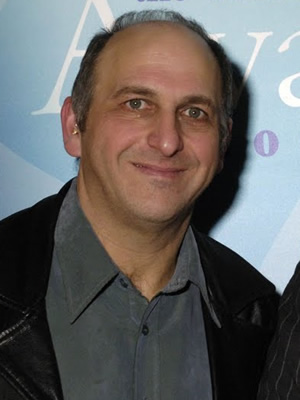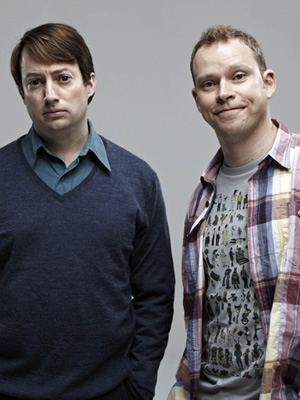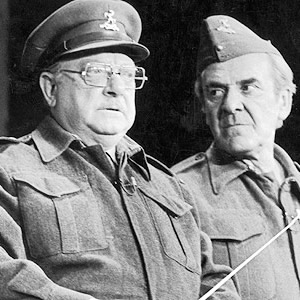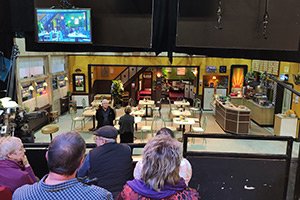Comedy Writing: Sitcom Clichés


All clichés are bad. Fact. Or is it? Writer and comedian Dave Cohen argues that for sitcom writers, clichés can be even better than sliced bread...
You're watching an audience sitcom on television. The main character says: "There is absolutely no way I am going to visit your sister tomorrow and that's final." You know that the next shot will show the character in close-up and as the camera zooms out, we'll be aware that he is, indeed, visiting his sister-in-law!
Clichés eh? Can't live with 'em, can't live without 'em. Why is there so much cliché on our TV and movie screens? I'm sure soap producers would argue that their turnarounds are so quick, they simply don't have time to forensically examine every line and improve on the lazy phrasing we writers all slip into from time to time. (Although the relatively minor expense of employing a few more Script Editors earlier in the production process would surely improve the scripts enormously.)
As writers we also have to take responsibility. In comedy, where the aim is to get to the joke in the shortest possible time, we have to be wary of slipping in a few over-used phrases to speed up the joke delivery process. There are no excuses for any to be found in a comedy script's dialogue: but embed them in your characters, that is, to use a cliché, 'show don't tell', and they can do a great job for you.
No one ever sits down to write or create a cliché. As comedy writers we are always hoping that a line or joke from our script will become a catchphrase but of course as soon as you try too hard, the magic disappears, along with the phrase. Occasional exceptions prove the rule: Harry Enfield and Matt Lucas have probably added more phrases to the language than the rest of the comedy writing community put together.
Clichés are widely-held truths, usually uncovered by writers, that grow old and stale with over-use. It's worth remembering why clichés are clichés: they were, when first heard, fantastic sentences or statements that reached the core of a great truth in the shortest possible time. Shakespeare wrote many, both testaments of the Bible gave us plenty more. Unfortunately they become over-familiar so as a talented and careful writer, which you undoubtedly are, you know not to use any in your scripts (unless you have a character whose comedy trait is that he talks in clichés).
Where clichés work is in their use as a tool for getting to the truth of your sitcom. And when I say 'truth', I don't mean 'fact'. Nobody cares whether what they're seeing on screen is true. Believable yes, but there is a big difference between the two.
As a writer you have to know there is an emotional truth at the heart of every episode of your sitcom. More than that, there's one at the heart of every scene and even more than that, in every line. At which point you're probably writing Frasier or M*A*S*H. Even if you're writing a 'no hugs, no messages' type of sitcom, of which Seinfeld is surely the finest example, you still have to create a world that's believable enough for the audience to want to return to it week in, week out.

Peep Show (pictured) is a sitcom about two blokes who share a flat. They may have had one or two things in common when they first met, but are far too different to still be friends. But Jez needs somewhere to live and Mark needs someone to talk to.
At its heart, Peep Show can be defined by one of the oldest comedy clichés there is: Jez and Mark, the odd couple. The Odd Couple was, of course, one of Neil Simon's greatest and most famous creations. It began as a stage play in 1965 and became a movie then a hugely successful long-running sitcom. In its original form it paired Jack Lemmon's neurotic control freak Felix with Walter Matthau's slobby, laid-back Oscar: two guys, forced together, who couldn't be more different.
Like Mark and Jez, it's a relationship defined by cliché: chalk and cheese, opposites attract, the thin line between love and hate. Simon was certainly not the first exponent. One of Britain's earliest sitcom creations, The Likely Lads, featuring the near identical-pairing of serious, stuffy Bob (Rodney Bewes) and womanising, street-wise Terry (James Bolam), first aired in 1964. Going back a century, you'd have to look harder to find an odder odd couple than Laurel & Hardy.
Going further back, James Boswell's Life of Doctor Johnson brings together two of Britain's greatest ever literary figures, friends and colleagues who could not have been more different. Although Malvolio is the main comic figure in Twelfth Night, there is much comedy mileage gained from the pairing of Shakespeare's own odd couple Sir Toby Belch and Andrew Aguecheek.
Writers starting out are often told to 'write what you know'. I would refine that phrase. What fires you up? What makes you angry? What moves you emotionally? And then you can start to think about how those feelings translate into universal truths, clichés, in fact.
Two very similar sitcoms appeared in the 1970s, both of which captured brilliantly the general sense of alienation involved in working for a giant corporation and the particular absurdity of advertising. The Fall and Rise of Reginald Perrin and the less well-known It Takes a Worried Man were both about outsiders, characters too self-aware and quirky to fit into the system. Each can be defined perfectly by the phrase 'fish out of water'.

There are countless other examples of sitcoms that immediately suggest a cliché: Dad's Army (pictured), the little man against the world; Steptoe and Till Death Us Do Part, you can choose your friends but not your relatives; Absolutely Fabulous, the child is the father (mother) to the (wo)man.
The great sitcoms work on many levels and sometimes you will find that the story can be told by more than one cliché. Frasier Crane is a fish out of water who can't choose his relatives, is unlucky in love and can fix everyone else's lives except his own.
Quite apart from the universal truths running through the whole show, every episode of Frasier can be defined by a single cliché that surfaces to a greater or lesser extent throughout the episode: 'You always hurt the one you love,' 'Better to have lived and loved than never to have loved at all,' 'A friend in need ... ' and you'll usually see that phrase illustrated in the first scene.
The pilot episode begins, as many more would, with Frasier at the radio mic - 'I'm listening' - and Ros pricking his self-importance. Then one by one we are introduced to all the other characters: Niles, Martin, Daphne and even Eddie. Every familiar character trait and relationship from the show is on view here: Niles' obsessive cleanliness, Daphne's kookiness, Eddie's dislike of Frasier. There's a whole scene devoted to Martin's chair. And that's even before the first commercial break - all of the above are established in a dozen or so minutes.
You could argue that the show was already guaranteed an audience since the character was established from Cheers but for every Frasier there are many Joeys. It isn't just the characters who are fully-formed from the opening scene: the show is packed with brilliant gags and, more daringly for a first episode, intensely moving pathos.
Audience sitcom is a notoriously difficult field in which to succeed and audiences feel more passionate about it than any other form. Frasier and Seinfeld proved it was possible to make hilarious, intelligent shows set in two or three rooms and with laughter in the background. Listen to the words - you won't hear a single cliché - but think about the characters, the premise, the stories. That's where you'll find them in abundance.
This article is provided for free as part of BCG Pro.
Subscribe now for exclusive features, insight, learning materials, opportunities and other services for comedy creators.



